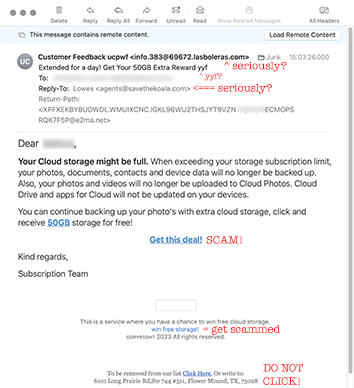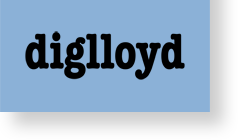Phishing: Don’t Get Scammed by FUD of Cloud Storage Limits — “Your Cloud Storage Might Be Full”
Consult with Lloyd on how to build a cost-effective and straightforward backup setup. Because as one of many risks, getting scammed can mean compromise of your computer and loss of your data.
Apple’s junk mail filtering has gone to crap lately. A few weeks ago, I started getting up to ten scammer emails every day, and so did my father. What in heck is going on at Apple that is letting this kind of crap on through?
In the age of AI, surely this kind of obvious scam can be suppressed with a 99.99% accuracy rate. Apple is asleep at the wheel while making your life difficult in every aspect of using your computer or phone, with an endless and obnoxious parade of security hassles while fixing severe zero-day exploits every two weeks, hoping you don’t notice. As a a software engineer, it looks like incompetence or perhaps willful negligence, or at least gross under-investment in things that matter everyday to everyone.
Phishing by claiming cloud storage shortfall
This example is one in an ongoing series of phishing and security examples.
The message below is ridiculous once looked at, but crucially, it preys on people using the hypnosis trick of letting you supply (in your own mind) your cloud storage vendor (eg Apple iCloud). Not actually mentioned, your mind fills in the necessary details. It’s a very powerful persuasion tricks, so powerful that most people will not even notice. Perhaps because the “news” uses it all the time these days.
- Unspecified service... which company?
- “might be full”... is it or isn’t it?
- Ridiculous reply-to of agents@savethekoala.com
- Ridiculous sender @lasboleras.com.
- Two additional links to get scammed. Win stuff and/or take yourself off the mailing list . Either of which of course will peg you as a soft target for further exploitation.
- A crapload of extra text that is hidden from your in the message source, designed to evade spam filters.
Don’t get taken-in by such messages.


 diglloydTools™
diglloydTools™






